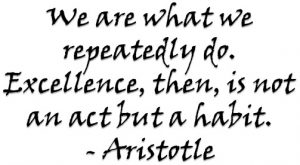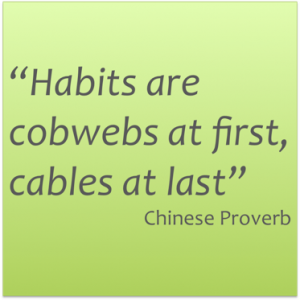Habits & Practice
A habit is a routine of behavior that is repeated regularly and tends to occur unconsciously
Wikipedia
![]() Danger! Habits can seem boring and they take some focus and some work to create. However, they can make your life easier and simpler and, at the same time, make a lot of good things happen. So, they are worth some attention and effort.
Danger! Habits can seem boring and they take some focus and some work to create. However, they can make your life easier and simpler and, at the same time, make a lot of good things happen. So, they are worth some attention and effort.
Basic Notes About Habits
1. This is About You and What You Want
Developing habits is about you becoming who you want to be. It’s about simplifying your life. It’s you being the author of your life. It’s not about you doing something that others think you “should” do.
2. Habits Keep Us Sane – They Simplify Our Lives
There are so many things to do in a day and so many decisions to make, that having most of them on auto-pilot (habits) is a life saver.
For me (for example), some habits are “well, duh” habits, like putting on my clothes before going down for breakfast, brushing my teeth after breakfast, putting my shoes under the bed so I don’t have to hunt for them, or putting my clothes in the same drawers after washing them.
Others require a little more thought to form and are designed to keep me from having problems later, such as immediately putting things on a replacement list when I use something – for example, a new toner cartridge for the printer. I just do these things and I don’t have to think about it.
3. Healthy Habits
There are also some habits I have that are healthy for me, such as doing sit-ups before I get out of bed in the morning, taking a moment to make sure I’m ready to bring my best before I enter a meeting and immediately making notes after a client meeting (I’m a management consultant). Taking ten minutes on the weekend to look ahead at my next week is another example of a simple habit that makes a big difference.
All of those habits make my life better and I don’t have to give much thought to any of them now that they are formed.
4. Unhealthy Habits
Then there are the habits I would like to have and the bad habits that I do have. Two of my most troublesome bad habits are (1) eating too much ice cream and good pastries and (2) being disorganized in terms of filing things and tracking my finances.
Both hurt me – one physically and one in terms of efficiency and effectiveness in my personal and professional lives. I feel guilty about those two and they have been bad habits for a long time, but I don’t do much about them.
Unless you have a very destructive bad habit that it is critical that you break, forming new good habits usually provides the most benefits.
That is because (a) old habits are hard to break without new habits to replace them; (b) new habits are easier to form; and (c) forming new good habits is useful throughout life, so getting good at it as a teenager is great preparation for being an adult.
So, we will address forming new habits first and then take a shorter look at breaking old habits.
5. Forming New Good Habits vs. Breaking Old Bad Habits
Unless you have a very destructive bad habit that it is critical that you break, forming new good habits usually provides the most benefits.
That is because (a) old habits are hard to break without new habits to replace them; (b) new habits are easier to form; and (c) forming new good habits is useful throughout life, so getting good at it as a teenager is great preparation for being an adult.
So, we will address forming new habits first and then take a shorter look at breaking old habits.
We become what we repeatedly do
Sean Covey. 7 Habits of Highly Effective
Teens
Seven Keys to Forming Your Desired Habits
1. So What? Why Develop a New Habit?
What will the habit get you? Why bother? New habits take work – over time – so make sure the habit is worth the investment. Make the benefits as clear as possible.Make sure it’s really something you want to do, and you can see the benefit. You are developing this habit because it is of benefit to you – not because you are “supposed to develop it.” Of course, others might also benefit from your new habit (like parents and teachers or siblings), but first make sure it will be of benefit to you.
Note. A lot of healthy habits don’t take a lot of energy to develop. They just take some attention. For example, one of my role models sends a communication to someone he knows every day. That’s a habit I would like to develop and can do so with little effort. I just need to focus on it a bit.
Tomorrow’s victory is today’s practice. –Multiple authors
2. Set Big Goals, But Take Small Steps
Some habits are small and some are large. For the large ones, build a bunch of small steps to establish the habit
For Simple Habits
Some habits are simple to develop. For example, if the habit you want to develop is to do one thing for someone each day, that is pretty straightforward, and you can probably just focus on developing that habit directly.
More Complex Habits
Some habits are tougher or more complex and are best developed through a bunch of small steps. For example, if you decide you want to eat a healthier diet you will probably want to identify the small steps that will get you there, none of which is too big.

For example, you can put some, or all, of the steps below together vs. trying to jump right to healthy eating.
- Set some easy to achieve goals for the beginning
- Talk to someone knowledgeable about healthy eating
- Check out resources on the internet (compare to find the credible ones)
- Choose one meal per day to start and see how that goes
- Expand to another meal when you are ready
- Start with foods that are easy to get or make
- Expand your menus when you are ready
- Find one or two others with a similar interest and support each other
- Track what you are doing and see what kind of a difference it makes
- Celebrate small wins
That might seem like a lot of steps, but each is small, and you can combine them pretty easily and you will be able to see your habit begin to grow.
3. Simplify – Create Routines
If you want to be able to have more mental resources throughout the day – to form new habits or just be creative – it helps to identify those parts of your life that can be turned into routines that happen the same way or at the same time. This is really not restrictive. It’s actually quite freeing.
Routines help get rid of clutter. The idea is to have fewer decisions to make, so you aren’t wasting time and attention on decisions that you’re probably going to make pretty much the same way. Then you can focus on the decisions that really need some thought.
There are lots of examples and most of them are small – but they add up. For instance, you can:
- Put out your clothes for the next day in the same place at night and then, when you wake up sleep deprived, you just stumble over and put them on.
- Do the same thing for anything you need for school or work the next day. The added benefit here is that you will forget fewer things.
- Brush your teeth immediately after a meal.
- Do your laundry the same night each week (if you do your own laundry).
- As soon as you get home, review your calendar to make sure you haven’t missed recording anything (like assignments) and know what’s coming
- There are lots of other examples.
The grass isn’t greener on the other side – it’s greener where you water it
Connect New Habits to Current Habits or Regular Events
Connecting new habits to current habits works for simple or complex habits. For example, it can be as simple as asking, “What can I do for someone today?” – right after waking up (I know that sounds impossible). Or asking, “What can I do for someone tomorrow?” – just before going to bed. That way you connect a new habit to an old one – sometimes called “stacking” or using triggers.
The reason for attaching your new habit to an already existing activity or habit is that it makes it easier to remember to do it. The activity or old habit “triggers” the new one. Obviously, the common factor is connecting your new habit to an old habit.
4. “Right Practice” – “Muscle Memory”
Habits get built into our brain. Literally. But they only get built in over time and with repetition. Once they are built in, they last as they are self-reinforcing. My sister-in-law had two Corgi dogs (which were nuts) and they ran circles around their house until they had built a circular trench. That’s how habits form. This is similar to the “right practice” that is so important in navigating the plateaus in the mastery process.
When we repeat actions to form a habit, we connect neurons in our brain and those connections get stronger and stronger. But we must consciously repeat the actions to build the connections and then we have a habit that pretty much runs on its own. Our brain is set up to make it happen automatically (or almost automatically). It’s also called “muscle memory”, particularly when related to sports or performing arts, but it’s mostly the brain and those neuron connections.
“I fear not the man who has practiced 10,000 kicks once, but I fear the man who has practiced one kick 10,000 times.”
Bruce
Lee
5. Go Public and Get Support
This is surprisingly important. When you put yourself out there, it deepens your commitment. It’s that simple. It is also part of getting support from others. You don’t have to paint your commitment on the side of your house or put it on social media. Just let key people know what you are committing to do – even the little commitments.
The support can range from building a new habit with someone else or a group to simply having someone ask you occasionally how you are doing. For some habits, like the eating healthy example, support can also come in the form of providing information or training.
6. Give Yourself a Reward
If you practice well and see a habit developing, take pride in it and give yourself a small reward that acknowledges your commitment. This sounds simplistic, but it’s important. Small rewards deepen the progress.
7. Be Prepared to Fail/Break Your Habit
You are going to break your habit at some point. The key is to acknowledge it and let it go, so you can get back to building the habit – without guilt.
Minor setbacks and frustrating moments can be habit killers: they can give us excuses to give up on forming a habit. Being too hard on yourself for messing up isn’t healthy because the path to habits is going to have setbacks, screw-ups, and frustrations – certainly not all the time, but few habits get formed without them.

There are lots of possible reasons for setbacks. Sometimes the habit is too ambitious or there isn’t enough support. Sometimes other things interfere or must take priority for attention and energy. Sometimes unexpected factors show up. Sometimes you just get tired, worn out or discouraged. And sometimes you just have a bad day or week.
The “Secret to Success.” So, expect some failures, acknowledge them as a natural part of the process, let them go without feeling guilty and get back to developing the habit. That secret to success is not just for habits – it will be important in many parts of life.


Breaking Bad Habits
Bad habits are tough to break because they provide some benefit we want. They can provide a reward, like dessert; stress reduction, like drug or alcohol use; escape from control, like not ordering your life, etc.
A habit becomes a bad habit when it puts you at risk or creates negative consequences in how it provides its benefit. For example, eating desserts or drinking alcohol are not necessarily problem behaviors. But they are problematic when they are habits – done in reaction and without real choice or moderation.
Habits are useful because they can simplify life by decreasing the number of decisions you need to make, but when they take the place of decisions that might be good for us to make, then they can be a destructive – to varying degrees.
The problem is that getting rid of a habit to avoid the negative consequences (why it’s a “bad” habit) also gets rid of the reward and who wants to give up rewards? Everyone has bad habits. The key is to avoid bad habits that are really destructive.
A Three-Part Cycle (good and bad habits)
There are three parts to habits and we need to deal with all three if we are going to break bad habits. If we take my bad habit of eating too many desserts as an example, the pattern is pretty clear. Unfortunately, it’s not easy to break the habit.
1. The Cue
The cue is what starts the habit. I finish a lunch or a dinner. Then my body thinks there is some unfinished business and says, “Hey, where is the dessert?”
2. The Reward
The reward is what comes to mind without any effort in response to the cue. I finish the meal and start looking for the treat – the ice cream or pastries. I want ice cream or a pastry to complete the experience (and my body wants the sugar and fat).
3. The Routine
The routine is the habitual act that I engage in to get the reward. I eat the ice cream or pastries. I might be thinking, “This really isn’t good for me”, but the behavior is going to happen unless I really focus on changing it.
That bad habit has dogged me for a long time. I have occasionally broken it, but it comes back. I’m not happy about it, but it continues.
The secret to permanently breaking any bad habit is to love something greater than the habit.
Bryant
McGill
Substitutes, Support and Going Public
For me to break this cycle I need to find a substitute for it. Sometimes fruit or cereal with berries works. Sometimes making sure that I exercise daily and weigh myself works.
The reward – or what I might like more than the habit – is feeling better and seeing weight loss.
However, what I really need to do is to enlist some help – ideas and ongoing challenge and support – and go public with my commitment to change the habit.. And I need to track my progress over time to see results that will become a reward.
The answers don’t always come easily.

